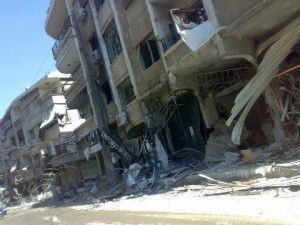Qudsayya: Scenes From a Disaster

As the elderly woman burst into tears, everyone on the packed bus – mainly students and workers on their way home – fell silent.
The woman had already caught their attention when she answered her phone and said, “They’ve slaughtered people in Qudsayya, using saws.”
She went on to say her house had been burnt down, her relatives arrested and her nephew killed.
My friend Ahmad told me about the incident on the bus, which happened a few days after the Syrian army went into the town of Qudsayya on October 3.

He said he was the only one who dared to comfort the woman. The other passengers, he said, did not even give her a compassionate glance, probably for fear of being picked out by a plain-clothes member of the security forces.
When I met Ahmad, he had a tormented look about him, as his own family lives in Qudsayya as well.
Qudsayya lies among a number of towns outside Damascus – Zabadani, Dummar and Al-Hama – that experienced unrest when popular protests broke out in Syria last year, but have not suffered as it has.
Ahmad’s mother and two sisters got out of Qudsayya, and he then managed to get to them. I met them a few days later in Barza, another town near Damascus, where they were living because their own house had been looted and destroyed.
Of the family, the younger of Ahmad’s sisters, Dalia, 17, was the most eager to talk about what happened the day the military offensive began.
“My mother and I went out to buy bread in the morning, after days of anticipation and fear. We saw members of the Free Syrian Army fleeing towards the Thawra quarter. Some of them were racing along in cars, others were running. One of them shouted at us to go home and hide because the army had laid siege to Qudsayya,” Dalia said.
“As we were hurrying back home, the first artillery shell struck the street where we live. More shells landed non-stop, one after the other. Our windows were broken and my sister and I had to hide in the bathroom. We were waiting for the end, feeling it might come at any moment.
“There was a very strong smell of gunpowder. We cried out in fright at the noise of the artillery fire. It soon became dark, and there was no power. In the silences between shell-bursts, we experienced a mixture of happiness and fear as we asked ourselves how we were still alive.”
Dalia said the shelling continued until evening, after which the family managed to board a bus weaving its way through the rubble to head out of Qudsayya. Troops manning a checkpoint on the exit route did not stop women and children from leaving. On the contrary, Dalia said, they stopped the bus and told the driver to make sure he got his passengers out of the town.
At this point, Ahmad was at a friend’s place outside Qudsayya. Government troops were preventing anyone from entering the town while military operations were under way.
The offensive ended on October 5, and a week later, Ahmad and his family went back to check on their house. They made the trip, like many others, after seeing announcements on pro-government TV that the army had declared the area “cleared of armed gangs”. This meant that the destruction and plunder perpetrated by government troops were over.
The family had left two laptops behind, as they feared carrying them could lead to them being arrested as opposition activists. In addition to a new television and most of the kitchen appliances, the laptops were stolen. They thanked God that they only lost items of property; some of their neighbours saw their sons executed and their homes burnt down.
The family’s neighbour Um Ayman, whom I also met in Barza, described how her 17-year-old son was killed in a massacre a few days before the shelling began. A local truce was broken on September 27, when pro-regime militiamen from the neighbouring Republican Guard quarter planted a bomb outside a school in Qudsayya, causing many casualties. Free Syrian Army, FSA, members retaliated and killed a number of members of the militia, which then attacked Qudsayya two days later.
According to Um Ayman, the attackers used women and young men, including her son, as human shields during the assault. But they mistakenly believed the Syrian army had already entered the town, and beat a retreat after discovering they were wrong.
After pulling out of the town, the militia killed the people it had taken captive. Ahmad told me that 12 people were murdered, and that all their names were known. His family and neighbours, however, insisted that the death toll was much higher. A YouTube video apparently filmed in Qudsayya shows the bodies of six people whose throats had been cut. The person behind the camera says the footage was shot on September 28.
After that, pro-regime media started reporting that citizens of Qudsayya were calling on the army to enter the town and rid them of “terrorist gangs”. Residents realised an invasion was imminent, as supposed appeals for help are commonly used to justify attacks.
Ahmad, his family and neighbours are now living far from home and they do not know when they will be able to go back.
They look back fondly on life when the FSA controlled Qudsayya. People were not afraid to speak their minds for fear of the army or security forces. According to Dalia, FSA troops were extremely courteous, unlike the regime troops who constantly harass girls.
Ahmad recalled the old lady on the bus, and turned away with tears in his eyes.
